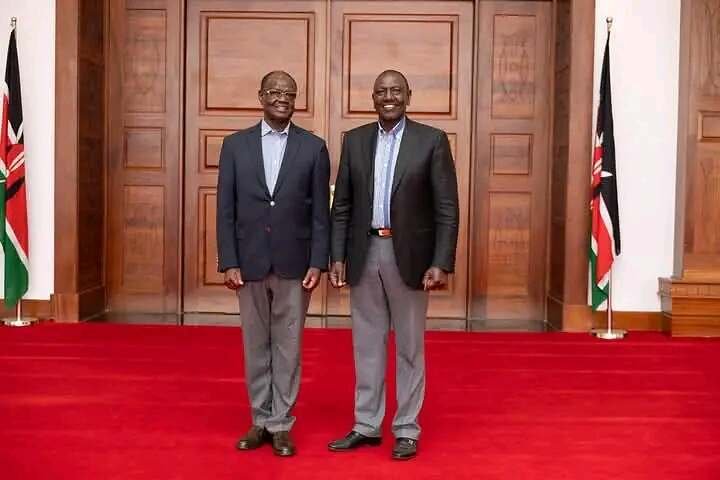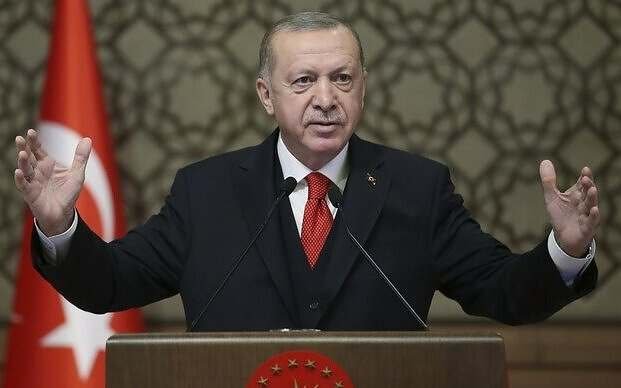
The recent allegations concerning travel bans imposed by the United States on two prominent Kenyan politicians, Oscar Kipchumba Sudi and Onesmus Kipchumba Murkomen, have sparked considerable debate both within Kenya and on international platforms. These claims suggest that key figures in the Kenyan political landscape may be facing restrictions that could impede their ability to engage with global allies and constituents. The controversy stems from documents purportedly detailing these travel restrictions, raising questions about their legitimacy and the motivations behind such actions.
Oscar Kipchumba Sudi, a notable member of the Kenyan parliament, has been involved in various political initiatives while being known for his vocal support of particular governance issues. Similarly, Onesmus Kipchumba Murkomen, a seasoned political figure and former Senate Majority Leader, plays a strategic role in shaping policy decisions in the country. Given their influential positions, any suggested travel bans would not only affect their personal and political activities but could also have wider ramifications on the political dynamics in Kenya.
Furthermore, the authenticity of the documented travel bans raises crucial concerns about sovereignty, diplomatic relations, and human rights. If the allegations regarding the travel restrictions prove to be accurate, it could lead to increased tensions between Kenyans and American authorities, as well as potential repercussions for Kenya’s international relations. Conversely, if the documents are found to be fabricated or misrepresented, the implications could reflect poorly on involved parties and give rise to a significant trust deficit in the political arena.
As this controversy unfolds, it is essential to remain vigilant and critically evaluate the information presented, understanding its potential impact on Kenyan politics and the broader international context. The case illustrates how politically charged narratives can influence public perception and provoke discussions beyond domestic borders.
Overview of the Alleged Documents
The controversy surrounding the alleged travel bans imposed by the United States on two Kenyan politicians is rooted in specific documents that have recently come to light. One of the key items is a purported press statement from the U.S. Department of State, which outlines serious allegations against the individuals in question. According to the document, the politicians are accused of engaging in acts of bribery and corruption, fundamentally undermining democratic processes in Kenya.
Furthermore, these allegations extend to connections with the Adani Group, a multinational conglomerate with a significant presence in various sectors. The documents claim that dealings with this group have raised ethical concerns, suggesting that the implicated politicians may have engaged in questionable transactions that warrant international scrutiny. The implications of these actions are severe, as they not only affect the politicians themselves but may also carry broader ramifications for Kenya’s governance and international relations.
In addition to the serious allegations, the supposed documents delineate the strict penalties faced by the individuals involved. Indefinite travel bans are reported, which would prevent these politicians from entering the U.S. Moreover, restrictions on visa issuance are also mentioned, indicating a broader strategy by the U.S. government to address issues of corruption and accountability in foreign governance. These measures signal a firm stance against the actions of public officials who exploit their positions for personal gain. The culmination of these accusations in the alleged documents shapes the ongoing debate about their legitimacy and the potential impact on the Kenyan political landscape.
U.S. Government’s Denial
The allegations concerning the purported travel bans imposed by the United States on two Kenyan politicians have evoked a swift and emphatic response from the U.S. government. Official statements issued by various U.S. embassies and agencies within Kenya have categorically denied the authenticity of the documents that allegedly substantiate these travel restrictions. According to these formal communications, the U.S. officials assert that the documents circulating around social media and other platforms are forgeries designed to create misinformation and confusion within both Kenyan and global political discourse.
Moreover, representatives from the U.S. State Department have reiterated their commitment to transparency and accuracy in diplomatic communications, emphasizing that they do not engage in punitive travel bans based on political affiliations. This public denial, backed by the operational protocols maintained by U.S. governmental bodies, is crucial in maintaining the integrity of international relations between the U.S. and Kenya. The U.S. has historically noted the importance of open dialogues and mutual respect in diplomatic engagements, which are fundamental to the partnership enjoyed between the two nations.
The implications of these denials extend beyond mere diplomatic courtesy. They serve as a pivotal moment in shaping the narrative around political trust among the Kenyan populace. With the heightened scrutiny of political figures and suspected manipulation of information, Kenyan citizens may experience a growing skepticism toward the integrity of both local and foreign political news. Ultimately, this development could either fortify the credibility of official statements from the U.S. or exacerbate public distrust if the allegations persist without clear resolution. The situation, thus, poses significant ramifications for public perception and the future of U.S.-Kenyan relations.
Political and Social Reactions in Kenya
The recent allegations surrounding U.S. travel bans imposed on two prominent Kenyan politicians have generated considerable political and social reactions within the country. Both politicians, who hold significant sway in Kenyan political spheres, have responded defiantly to the accusations, labeling them as unfounded and politically motivated. Their statements emphasize the ongoing struggle against external interference in Kenya’s domestic affairs, thus reinforcing their popularity among certain voter blocs that perceive these travel bans as a form of neocolonialism.
In the Kenyan media landscape, the story has dominated headlines, with outlets exploring various facets of the controversy. Some media reports have examined the possible implications for Kenya-U.S. relations, suggesting that these travel restrictions could undermine diplomatic ties. Political analysts have weighed in, arguing that such measures might inadvertently bolster the politicians’ narratives of victimhood and rally their supporters around a common cause, framing the situation as an attack on Kenyan sovereignty.
Public sentiment is notably mixed; while there are those who view the travel bans as a legitimate response to alleged misconduct, others have emerged as vocal critics of the U.S. government’s involvement in Kenyan affairs. Social media platforms have played an indispensable role in shaping this discourse, with hashtags related to the incident trending across various networks. Citizens have used social media not only to express their opinions but also to circulate purported documents that detail the alleged bans, further fueling the controversy and creating a considerable buzz online. In this digital age, these platforms facilitate a rapid exchange of views, reflecting the diverse and often polarized opinions held by the Kenyan public.
The reactions highlight how political narratives can be influenced substantially by both social media dynamics and media coverage, producing a compelling tableau of national sentiment following this unfolding controversy.
Investigating the Truth
In today’s digital landscape, where information flows rapidly and often unfiltered, the verification of sensitive information has become paramount, particularly regarding political matters. The recent allegations surrounding the supposed U.S. travel bans on two Kenyan politicians exemplify the critical need for careful scrutiny of claims before they are disseminated. Misinformation can easily proliferate, leading to significant diplomatic consequences that could ensnare nations and individuals alike in a web of falsehoods. Should the documents circulating in relation to these allegations be verified as fraudulent, the repercussions may extend beyond these individuals, potentially jeopardizing Kenya’s political landscape and U.S.-Kenya relations.
The spread of unverified claims not only threatens the reputations of the individuals implicated but also raises pressing legal and ethical questions regarding accountability. Various stakeholders, including journalists, politicians, and the general public, carry a responsibility to ensure that the information shared is accurate and substantiated. Irresponsible reporting or sharing can damage diplomatic ties, create unwarranted distrust, and foster animosity between nations. It is creative to consider the stakes involved when information regarding international relations is misrepresented or exaggerated.
Furthermore, organizations dedicated to news distribution and political communication have an ethical obligation to navigate these issues with caution. They must employ rigorous fact-checking processes and prioritize transparency in their reporting. This precaution is especially essential in cases with far-reaching implications, as misinterpretations can escalate tensions at both national and international levels. Ultimately, the integrity of any public discourse hinges on the commitment to validate claims before spreading them, particularly concerning sensitive political matters. Given these complexities, a careful approach toward gathering and disseminating information is essential for maintaining the ethical standards of democratic dialogue.
Broader Context of Corruption Allegations
Corruption has long been a persistent issue within Kenya’s political landscape, undermining public trust and hindering development. Historical instances of graft and mismanagement have significantly impacted governance, with numerous allegations surfacing against high-ranking officials over the years. These corruption claims not only destabilize domestic politics but also affect how Kenya is perceived on the international stage. Global stakeholders are increasingly scrutinizing these issues, with foreign governments and international organizations keenly observing Kenya’s efforts to combat corruption and promote good governance.
The implications of corruption allegations in Kenya extend beyond the national borders, influencing foreign relations and potential investment opportunities. Countries that uphold strong anti-corruption measures are often viewed favorably, attracting foreign direct investments and fostering bilateral relations. Conversely, pervasive corruption can deter potential investors, as uncertainty regarding the integrity of government processes undermines trust. In this regard, the reputation of Kenya as a stable and reliable partner in international dealings has been threatened by recurrent corruption scandals, casting a shadow over its governance practices.
Moreover, the global community plays a critical role in addressing corruption in Kenya. International aid and partnership agreements often incorporate stipulations that advocate for transparency and accountability. Countries that provide aid to Kenya may impose conditions aimed at promoting good governance, thus exerting pressure on Kenyan authorities to tackle corruption effectively. As the U.S. and other nations contemplate diplomatic actions against specific Kenyan officials linked to corruption, the implications for Kenya’s international standing are profound. This interplay between domestic corruption and international relations is crucial in understanding the current controversy surrounding alleged travel bans on Kenyan politicians, as it highlights the ongoing challenges faced in the fight against corruption and its far-reaching consequences.
Lessons and Way Forward
The recent allegations surrounding the supposed travel bans imposed on two Kenyan politicians have sparked significant debate, highlighting the urgent need for increased transparency and accountability within both local and international governance frameworks. It is essential that political leaders and agencies operate under a system that encourages open communication and responsibility, especially regarding decisions that may impact individuals’ rights and reputations. Establishing clear channels for accountability can mitigate misunderstandings and bolster public confidence in these systems.
Moreover, prior to disseminating information about politically sensitive matters, thorough investigations should be conducted. Allegations should be substantiated with concrete evidence before they are publicized, particularly in the media. This preventative measure can prevent the spread of misinformation, which often instigates unwarranted public outrage or panic. The media holds a powerful position in shaping narratives and public perception. Therefore, there is a paramount responsibility to approach such topics with the utmost integrity, ensuring that they report facts rather than speculation.
The role of the media cannot be understated when addressing significant political issues. Journalists must engage in responsible reporting that encourages informed public discourse and enhances understanding of complex political landscapes. This includes providing context and exploring the implications of events, rather than simply reporting on allegations. Additionally, collaboration between media organizations and political analysts can lead to richer, more nuanced coverage that embodies various perspectives.
As we navigate challenges like those presented by the allegations against Kenyan politicians, it is crucial to develop frameworks that foster openness and accountability while calling for responsible journalism. By prioritizing these actions, society can work towards a more equitable political environment, paving the way for informed discussions and constructive outcomes.
Conclusion
The controversy surrounding the alleged travel bans imposed by the United States on two prominent Kenyan politicians has sparked significant debate and discussion within both Kenyan society and the broader international community. These purported restrictions have raised concerns about the implications for Kenya’s political climate, particularly regarding the relationship between Kenyan leadership and U.S. foreign policy. Questions surrounding the validity of these travel bans highlight the complexity of geopolitical relationships and the influence of external actors on domestic politics.
As discussions unfold, it is essential for both Kenyan and U.S. officials to provide clear and transparent communication regarding the status of these alleged restrictions. Clarity on the motives and circumstances surrounding such travel bans could greatly influence public perception and political dynamics in Kenya. Given the intertwined nature of political power, public interests, and international relations, understanding the consequences of these actions is paramount for maintaining a stable political environment.
Additionally, the current situation emphasizes the necessity for the public to maintain vigilance in discerning fact from fiction amid the deluge of information circulating in the media. Misinformation can easily exacerbate political tensions and create misunderstandings between nations. Therefore, it is crucial for individuals to approach news and updates regarding the travel bans with a critical eye, ensuring that discussions are grounded in verified information rather than speculation.
Ultimately, the controversy serves as a reminder of the delicate balance that exists between national sovereignty and international relations. Moving forward, it is imperative for all parties involved to seek resolution through diplomatic channels to foster trust and collaboration for a more equitable political landscape in Kenya.







1 thought on “The Controversy Behind Alleged U.S. Travel Bans on Two Kenyan Politicians”